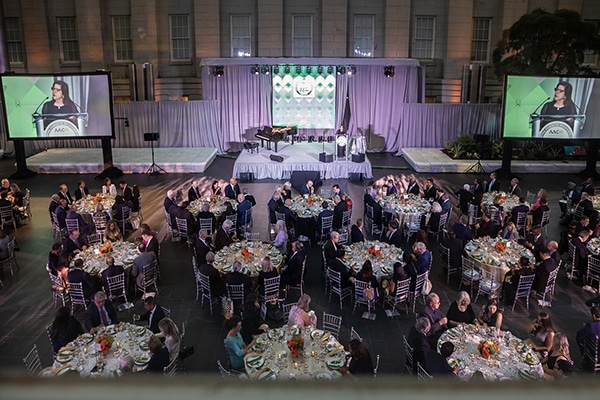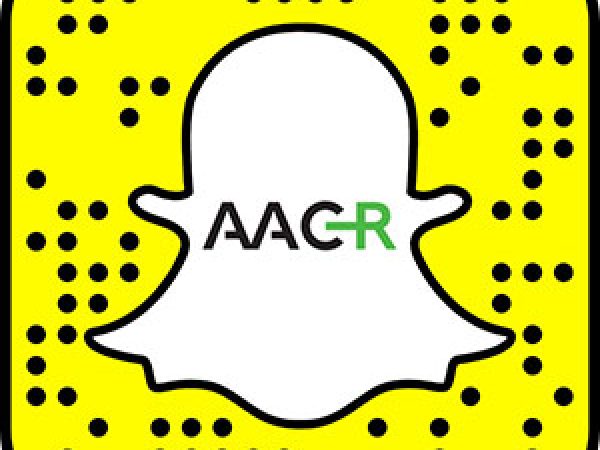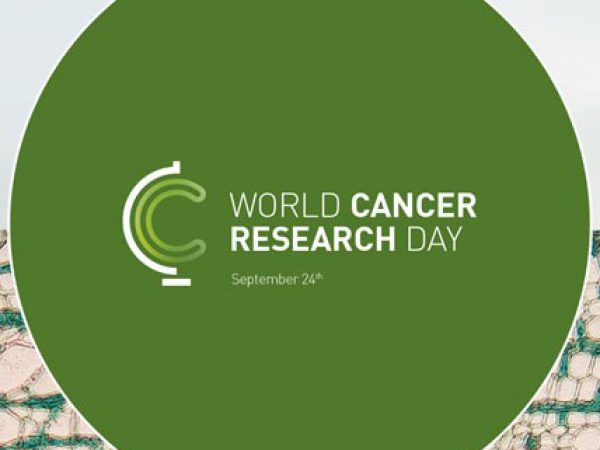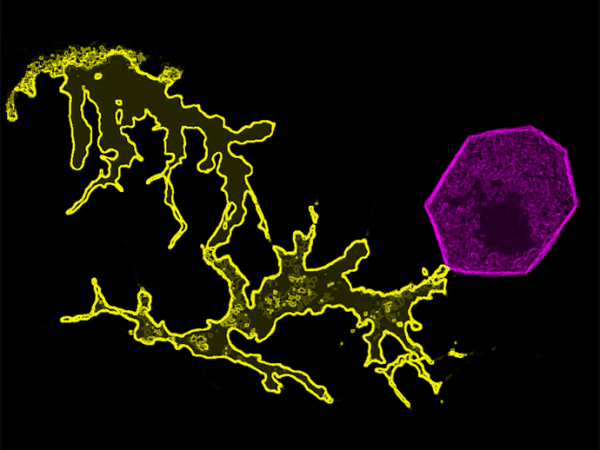AACR Celebrates 115 Years as the Driving Force to Eradicate Cancer
Washington, D.C., holds a special place in the history of the American Association for Cancer Research (AACR). In 1907, 11 visionary physicians and laboratory scientists gathered at the city’s Willard Hotel and founded the AACR “to further the investigation and spread the knowledge of cancer.”
Wednesday evening, 115 years after that initial meeting, the AACR celebrated its anniversary with a gathering in Washington’s National Portrait Gallery, drawing 250 guests from all corners of the cancer research field.
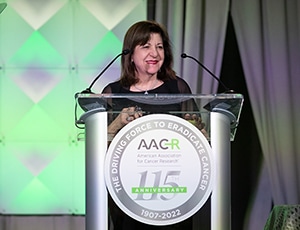
“It is thrilling to be here tonight among so many of our esteemed AACR members, colleagues, and friends in the cancer community, including researchers, physicians, members of the pharmaceutical and biotechnology industry, patient advocates, policymakers, and representatives of other scientific, clinical, and philanthropic organizations,” said AACR Chief Executive Officer Margaret Foti, PhD, MD (hc).
“Our 115th Anniversary provides us with a unique opportunity to contemplate the powerful impact of AACR on the lives of cancer patients, and to reflect upon our spectacular history that goes hand in hand with the evolution of the cancer field,” Foti continued.
Naturally, 115 years of history encompasses too many milestones to cover in a single night. Many key milestones have been captured in the Landmarks in Cancer Research exhibit. Wednesday’s celebration featured an extensive list of science, policy, and advocacy awards that recognize all aspects of the AACR’s work. Lisa M. Coussens, PhD, FAACR, current President of the AACR, described the AACR as a “fulcrum” in the cancer research community, bringing together all sectors to support the complete life cycle of cancer research.
“The public perception of cancer research often includes scientists in white coats peering through microscopes and making discoveries. That, of course, is at the core of our work. But bringing the innovations that result from scientific discoveries to patients is a much broader endeavor that extends beyond the research labs and involves the concerted efforts of many players,” Coussens said, noting government, philanthropy, academia and cancer centers, industry, scientific organizations, and advocacy and the lay public as the key sectors in the cancer research continuum.
“Tonight, we will recognize the contributions of these sectors by honoring individuals and organizations that have been working closely with AACR to make collective progress against the disease,” Coussens said. Here are the awardees:
AWARDS FOR POLICYMAKERS
AACR Award for Distinguished Public Service and Global Impact in Cancer Research and Biomedical Science: Senator Roy Blunt (R-Missouri), in honor of exceptional congressional service and unparalleled support of vital medical research funding for the benefit of public health. “One of my proudest accomplishments has been realigning priorities to ensure funding of biomedical research,” Blunt said in video remarks. “We’ve got to find a way to make sure we don’t miss out on the next Jim Allison or the next Carl June.”
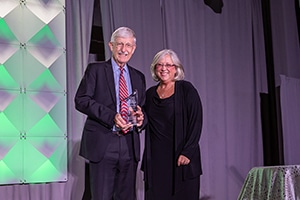
AACR Distinguished Public Service Award for Extraordinary Leadership in Medical Research: Francis S. Collins, MD, PhD, Acting Science Advisor to President Biden and Co-Chair of the President’s Council of Advisors on Science and Technology, in honor of exceptional leadership and sustained contributions to science and technology advancements during his long tenure as director of the National Institutes of Health (NIH). Collins, describing attendees as “fellow believers in the promise of what medical research can do,” voiced eagerness to help Biden achieve the goals set forth in his Cancer Moonshot, including work on liquid biopsies for early detection and efforts to end cancer health disparities. Collins has his own trove of ideas as well, such as targeting stage 4 metastatic cancers and preventing Hepatitis C infections to reduce liver cancer incidence.
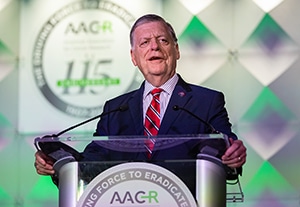
The AACR Distinguished Congressional Champion Award for Extraordinary Support of Medical Research: Representative Tom Cole (R-Oklahoma), Representative Rosa DeLauro (D-Connecticut), and Senator Patty Murray (D-Washington), in honor of exceptional congressional leadership and support for vital medical research funding for the benefit of public health. Cole delivered remarks on behalf of the trio of lawmakers, reflecting on how his work on the House Appropriations Committee often required him and his colleagues to cross party lines as they forged alliances and negotiated support with lawmakers they weren’t always aligned with. Securing funding for the NIH and National Cancer Institute (NCI) was always worth the battles, he said: “There are some things that transcend politics.”
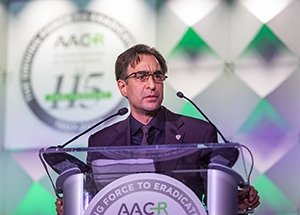
AACR Distinguished Public Service Award for Exceptional Advocacy in Support of Medical Research: Jed Manocherian, Founder and Chairman of ACT for NIH, in honor of sustained efforts to advocate for medical research funding to improve public health. As noted by several speakers, NIH funding stalled for 12 years in the early 2000s. Manocherian’s ACT for NIH advocated for strong funding for biomedical research and helped secure consistent increases in the NIH budget. Going forward, Manocherian said NIH funding must remain robust to ensure that early-career investigators receive funding for their work. “We are at risk of losing an entire generation of brilliant young cancer researchers. We should unapologetically advocate for increases to the NIH budget every year until we are no longer discarding highly merited research,” he said.
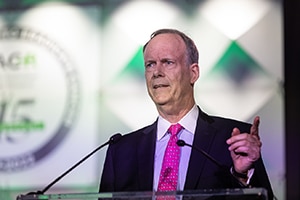
That sentiment was echoed by Nobel Laureate William G. Kaelin Jr., MD, FAACR, who reflected on the dramatic improvements in cancer treatments in the past two decades. “The opportunities in cancer science have never been greater. But a lot of young people are voting with their feet and pursuing other opportunities,” Kaelin said. “Predictable funding will help keep them in research.”
AWARDS FOR PHILANTHROPY AND INDUSTRY
“As scientists, we have ideas that we hope will benefit society,” said AACR Past President Raymond N. DuBois, MD, PhD, FAACR. “In truth, there is not enough support available to bring all good ideas to fruition.”
To bridge the gap between federal funding, academic funding, and the steep cost of most scientific projects, financial support from philanthropic groups, private donations, and corporations is necessary. “Generosity truly makes a difference,” DuBois said.
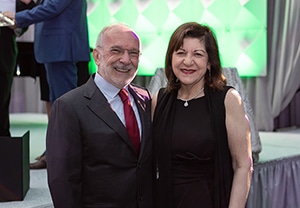
The AACR Outstanding Achievement Award for Service to Cancer Science and Medicine recognized three distinguished organizations that have played distinct roles in supporting cancer science. The Pezcoller Foundation; President, Enzo Galligioni, MD; and Distinguished Former Presidents received the award in honor of sustained international efforts to recognize, promote, and support cutting-edge cancer research. Galligioni expressed pride in the 25-year alliance between the AACR and Pezcoller, through which the Pezcoller Foundation-AACR International Award for Cancer Research is given each year at the AACR Annual Meeting.
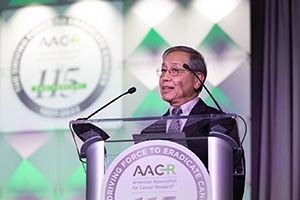
Also, Stand Up To Cancer; President, Russell Chew, DDS; the SU2C Founders and Advisors; and the Scientific Advisory Committee in honor of sustained dedication to raising significant funds in support of innovative translational cancer research to improve patient care. The AACR is the Scientific Partner of Stand Up To Cancer. “The notion of serving cancer patients has been the heart of our mission,” Chew said. “For 14 years, we’ve never taken our eyes off that singular purpose.”
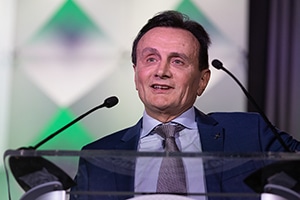
As noted by AACR Past President Michael Caligiuri, MD, FAACR, industry stakeholders occupy a significant role in the quest to end cancer. AstraZeneca and Chief Executive Officer, Pascal Soriot, were the third recipients of the Cancer Science and Medicine Award in honor of sustained dedication to advances in innovative cancer research, development of novel therapeutics, delivery of life-changing medicines to patients worldwide, and generous support of AACR programs and activities. “We know that cancer is a devastating disease,” Soriot said, “But thanks to the work of many of the people in this room, outcomes are rapidly being transformed.”
Philip Greenberg, MD, FAACR, President-Elect of the AACR, echoed those sentiments, noting that improvements in diagnosis and treatments are leading to a “global shift in how everyone views cancer—from a feared diagnosis fraught with negative connotations, to a diagnosis that is manageable, with promising and less toxic treatment options, and no longer associated with an immediate fear of death.”
AWARDS FOR ADVOCACY
The AACR Outstanding Achievement Award in Public Service, Cancer Research, and Advocacy was awarded to three recipients. The Leukemia & Lymphoma Society and President and Chief Executive Officer, Louis J. DeGennaro, PhD, received the award in honor of the organization’s commitment to promoting and supporting advances in blood cancer research and patient care. DeGennaro said the Leukemia & Lymphoma Society has helped fund development of 75 percent of the approximately 100 therapies that are approved for blood cancers. “I have no doubt that we can drive change so that the cancer patients of today can not only survive, but thrive,” he said.
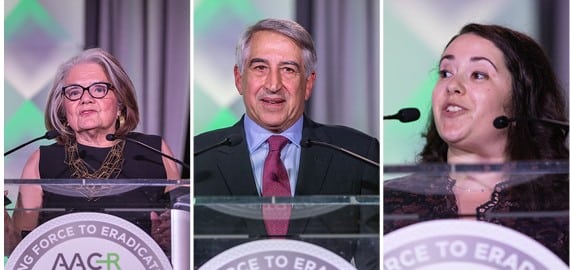
The St. Baldrick’s Foundation was recognized in honor of steadfast commitment to the support of advances in childhood cancer research and improved patient care. Despite tremendous progress childhood cancer remains the number one cause of childhood death. “We are grateful for our collaboration with AACR as we work to give children a life beyond their diagnosis,” said Sarah Milberg, director of Government Relations and Advocacy for St. Baldrick’s.
Also, Frances M. Visco, JD, president of the National Breast Cancer Coalition, was honored for her trailblazing efforts to establish the cancer patient advocacy movement. Visco reflected on the tremendous growth of the advocacy community in the past few decades. “In 1991, when we began, it was not in vogue to have patient advocates at the table,” she said. “There are many scientists in this room who embraced our model of advocacy, and we are all better for it.”
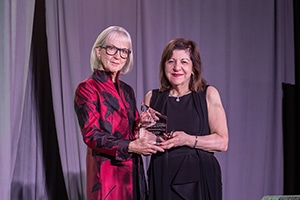
The AACR Distinguished Service Award for Exceptional Leadership in Cancer Research, Science Policy, and Advocacy was awarded to Anna D. Barker, PhD, FAACR. Among many visionary contributions to cancer research, Barker was honored for extraordinary leadership of the AACR Scientist↔Survivor program, which has fostered synergies between the scientific community and hundreds of national and international patient advocates. Barker reflected that early in her career, science, policy, and patent advocacy were completely siloed. She attributed much of the progress in integrating these disciplines to the AACR. “I came to the AACR for the first time as a postdoc. I knew the AACR was going to reshape cancer research, and so it has,” she said.
The AACR’s Immediate Past President, David A. Tuveson, MD, PhD, FAACR, noted that the AACR continues its role as a convener, recently hosting a meeting of cancer center directors. There, he said, the directors identified key priorities such as improving clinical trial design to enable more efficient sharing of resources and data; and increasing diversity in the scientific workforce.
That goal was underlined by John D. Carpten, PhD, FAACR, who praised Foti and the AACR for its efforts in increasing diversity and equity, such as the creation of a conference on the Science of Cancer Health Disparities and the development of a Minorities in Cancer Research membership group. “Although science is the foundation of AACR, justice might be its heart,” Carpten said.
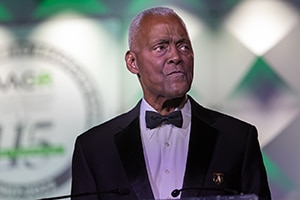
Retired Col. Gary Steele, who has shared his experience with prostate cancer and multiple myeloma with the AACR’s Cancer Progress Report, said he hopes that the progress that has allowed him to successfully battle two types of cancer will only increase as his children and grandchildren grow older. He has expanded his role with the AACR and now serves as a Trustee of the AACR Foundation.
“There is no way I would be here without the efforts of AACR, the members, and everyone doing their best to prevent and cure cancer,” he said.
